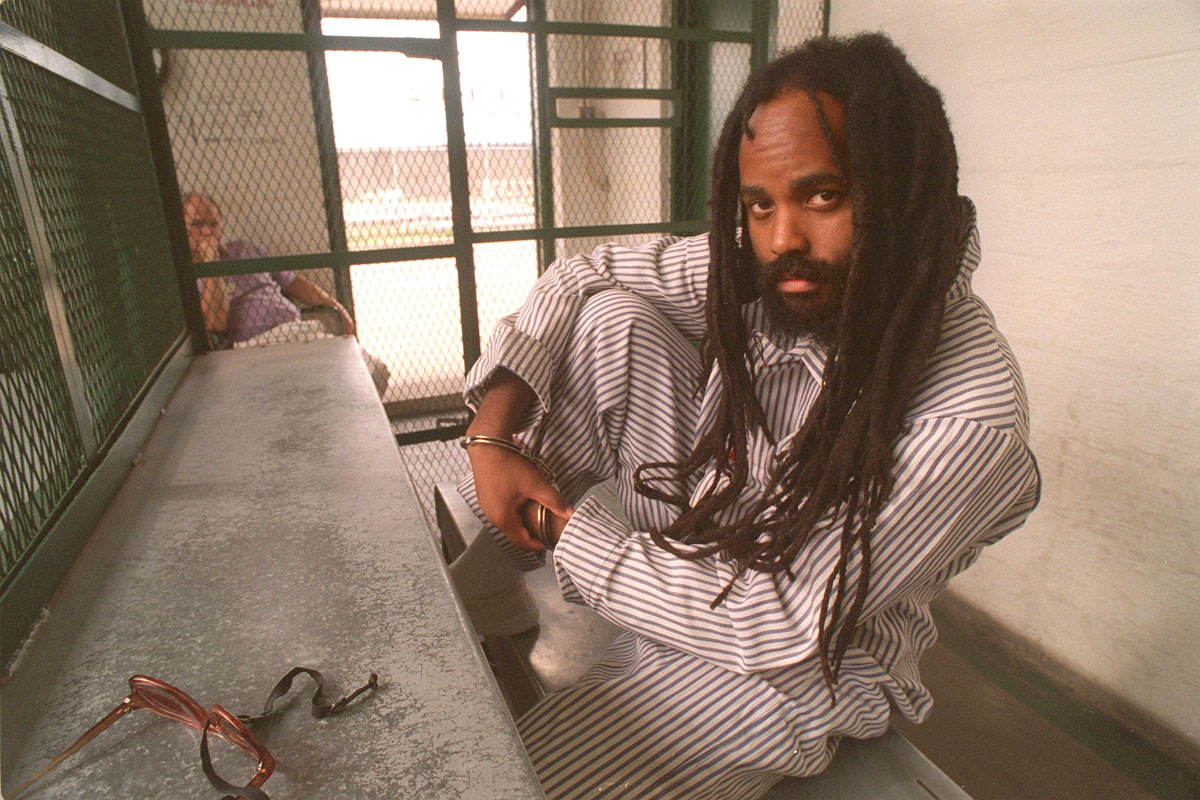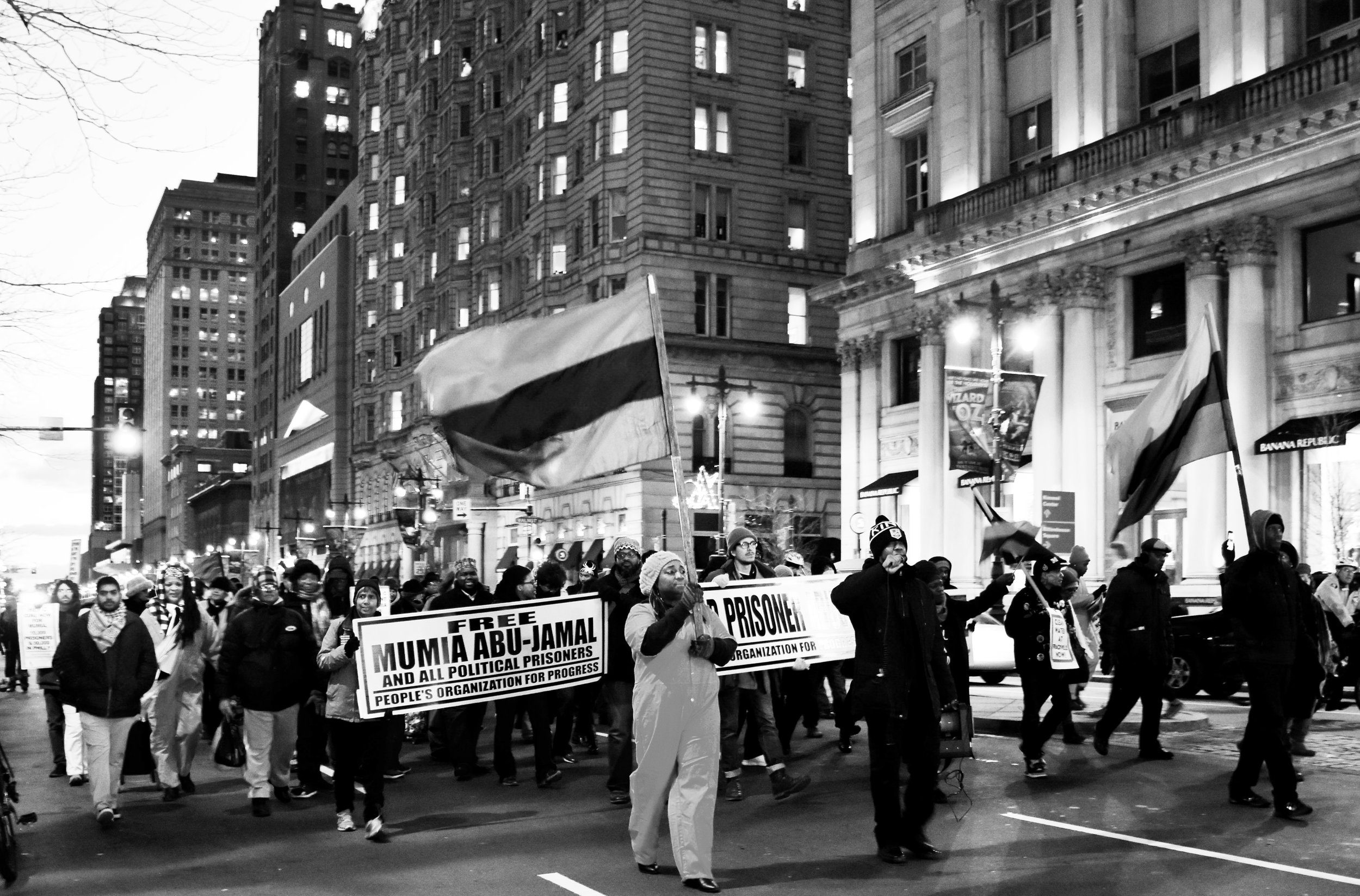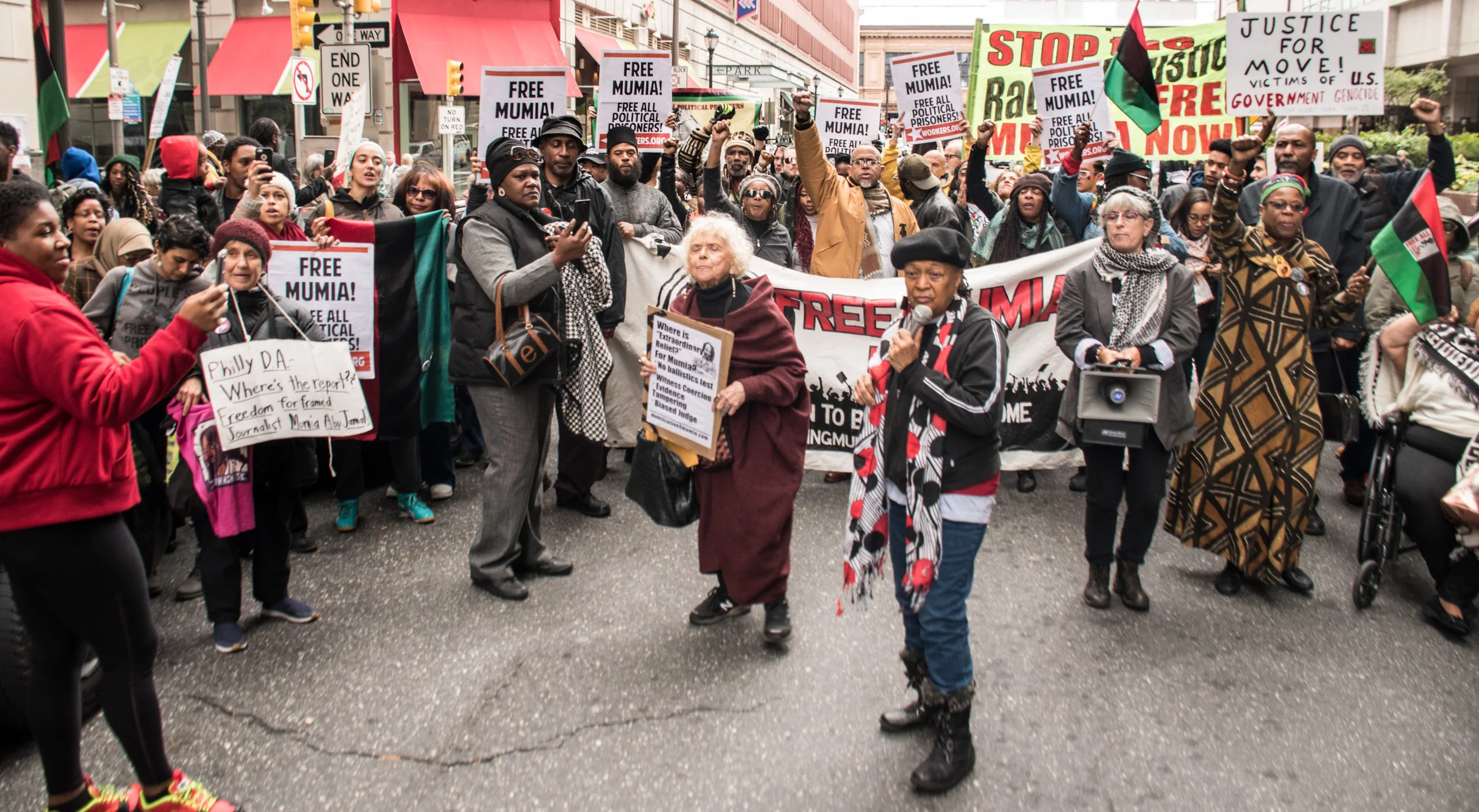
Mobilization 4 Mumia is fighting for Mumia Abu-Jamal's freedom and for his right to proper healthcare.
Mobilization 4 Mumia includes the following groups: International Concerned Family & Friends of Mumia Abu-Jamal; International Action Center; Free Mumia Abu-Jamal Coalition (NYC); Campaign to Bring Mumia Home; Mobilization to Free Mumia Abu-Jamal; LoveNotPhear and Educators for Mumia Abu-Jamal
Mumia Abu-Jamal is an internationally recognized journalist known as, "the voice of the voiceless" for his many years spent writing about issues relating to working class people of color, prisoners, and the under represented. He has written eight books and countless articles and commentaries from a prison cell on death row in Pennsylvania.
The movement for Mumia Abu-Jamal is an international network that has taken to the streets for over thirty years to stop two state sponsored executions, organized to overturn his death sentence, recently sponsored a landmark court case which forced the PA Department of Corrections to administer treatment for his Hepatitus C. The DOC withheld his diagnosis for years and after it was discovered they refused to provide treatment for Mumia as they have for 6,000 other PA prisoners. This new victory will create a precedent to give treatment to all prisoners. WIth Mumia's health still in a critical state and a new Supreme Court decision that could bring him back into court the fight for Mumia's life is in urgent need of your support!
Become a monthly supporter.
Mumia supporters take the street following a Oct 29, 2018 court hearing.
Your monthly donation will help fund the everyday work and organizing efforts of the Mobilization for Mumia. The funds will help pay for the work of organizing the movement: printing and designing posters and flyers, venues for meetings and rallies, speaker fees, sound systems, travel costs, and lots of other costs. With even a small monthly donation the work to save the life of Mumia can continue stronger than ever and together we can bring Mumia home!
When you become a monthly supporter your donation will be automatically withdrawn every month.
DONATE $5.00 a month
DONATE $10.00 a month
DONATE $25.00 a month
DONATE $50.00 a month
MAKE A ONE TIME DONATION
“Very few people in prison have voices that go beyond the wall. It's my job to do the work for them because they have no one.”
MUMIA ABU-JAMAL

History
On December 9, 1981 Mumia Abu-Jamal, a journalist and former Black Panther, was arrested for the murder of a white Philadelphia police officer Daniel Faulkner. He was convicted and sentenced to death in a trial that was rife with perjured testimony and manufactured evidence that Amnesty International found, "did not meet the minimum international standards for a fair trial."
Mumia was working as a cab driver to make extra money when he happened upon Officer Faulkner, who had stopped his brother Billy Cook, and was beating him in the head with a metal flashlight. The prosecutor, Joseph McGill, presented a story that has Mumia running behind the officer and shooting him in the back. He then claimed that the officer turned around and pulled his weapon shooting Mumia in the chest. McGill ends the story by saying the officer fell to the ground where Mumia stood over him and unloaded on him, missing with four shots but hitting him once between the eyes. McGill also claimed that Mumia confessed to the shooting later on in police custody.
None of the physical evidence supports the prosecution's case! Mumia did legally own a gun, not uncommon for anyone driving a cab in Philadelphia during that time. However, the police never tested his gun to see if it had been fired nor tested his hands to see if they had recently fired a gun. They bullet taken from Faulkner could not be matched to Mumia's gun.
There were no divots in the sidewalk around the officer's head as there would have been if the shooter had stood above him. The only bullets that were found were approximately eight feet west to where Faulkner was laying and were from an angle that would not have been possible from the trajectory where Mumia entered the scene. The bullet wound that hit Mumia also debunks the prosecution's scenario. The bullet was traveling at a hard downward trajectory suggesting that his body was learning forward while still running to the scene when he was shot, and that the officer was elevated, likely standing on the sidewalk. The prosecution witnesses told different stories in their original statements than they did at trial. One, a prostitute named Cynthia White, changed her story five times by the time she reached trial. Another, a cab driver named Robert Chobert, who was driving with a suspended license while on probation for arson, first told arriving officers, "the shooter ran away." He then said the shooter ran thirty feet and fell despite the fact that Mumia was laying less than three feet from Faulkner. Crime scene photographs that were never disclosed to the defense until 2007 show that Chobert was not parked where he said he was. They also show confirm that there were no bullet divots around Faulkner's head, that police collected evidence incorrectly - damaging its integrity, and that the officer's hat had been moved from its original place on the roof of a car suggesting that Faulkner was talking to a passenger.
Four different witnesses claimed that they saw someone running from the scene. In 1995 at a post-conviction relief act hearing it was discovered that Faulkner had a temporary drivers license for another person in his pocket when he was killed. The owner of that license, Arnold Howard, revealed at the hearing that though he was able to prove he was not there that night that he had loaned his license to a friend named Kenneth Freeman who was close with Billy Cook.
There were three different police officers who claimed that Mumia confessed. The only officer who testified at trial, Gary Bell, claimed that after Mumia was brought into Jefferson hospital for his gunshot wound that he yelled, "I shot the motherfucker and I hope the motherfucker dies." However, the officer never made a report of the incident and claimed to have forgotten this crucial information for over sixty days. He had no recollection until after Mumia's defense attorney file police brutality charges due to the fact that the officers beat him when they arrived on the scene. After that filing all three officers came forward in the subsequent weeks with stories of a confession. The two other officers, Gary Wakshul and Thomas Bray came forward and neither of them had made a report on the night of the shooting. Wakshul even went as far in his original report to say, "The male negro made no statements." He made a second report a week later where he offered recollections of tiny details even so far as to remember the make and model of a camera found in Faulkner's car but made no mention of a confession. He later claimed that he just forgot.
Wakshul claimed that Mumia said, "I shot the motherfucker and I hope the motherfucker dies" while lying on the ground in the ER, unlike Bell, who claimed he said it while entering the hospital. Bray claimed that later while on a gurney Mumia confessed to him but in his story Mumia said, "I shot him and if you let me go I will kill all of you cops." The doctor who operated on both Mumia and Faulkner heard no confession and neither did any of the hospital staff. None of the officers corroborated each others stories.
After the police officers came forward with a confession story a hospital guard named Priscilla Durham came forward and claimed she heard a confession as well, but never alerted the police. She was interviewed by the prosecution and brought to trial. During the trial she claimed, for the first time, that she made a handwritten report about the confession the day after the shooting but only gave it to her superior officer. She somehow never mentioned this to the prosecution or the police despite being interviewed by both. During the trial the judge sent a police officer to the hospital who returned with a piece of paper that was not on hospital letterhead, was typed, and was not signed. This document was allowed to be submitted as evidence over the objections of the defense.
At the trial the defense tried to call Gary Wakshul after Mumia discovered his report claiming that "the male negro made no statements." The prosecution claimed that Wakshul was unavailable due to being on vacation. The judge refused to delay the trial and told Mumia and his attorney that they, "goofed." The defense would later learn that though Wakshul was technically on vacation he was instructed by the DA's office to stay at home incase he was called for trial, a fact that was hidden by the prosecutor.
Mumia had a court appointed lawyer who did not have the funds to investigate witnesses or do any ballistics investigations whatsoever. The judge who presided over the case was Albert Sabo, a former Sherrif and member of the Fratneral Order of Police who presided over more trials ending in death sentences than any other judge in the US. A third of all lawyers surveyed by the American Bar Association in Philadelphia said that he was unfit to be on the bench.
While the original trial was underway a court stenographer, Terri Maurer-Carter, for Judge Richard Klein entered Sabo's chambers and overhead Sabo complaining about the performance of the prosecution and said, "I'm gonna help them fry that nigger".
During Mumia's Post Conviction Relief Act Hearings Judge Sabo was brought out of retirement to preside. He sustained every single prosecution objection and quashed most of the subpoenas brought forth by the defense. He did not find that Mumia deserved a new trial and said so in a finding of fact that was a carbon copy of the prosecution's closing brief.
Ready to help?
—
Donate

